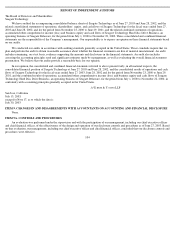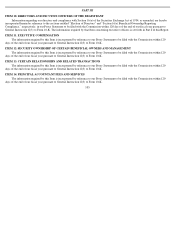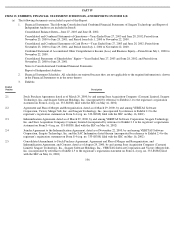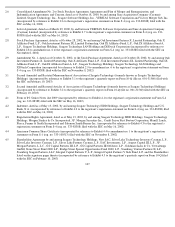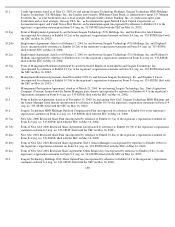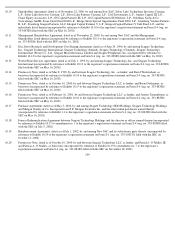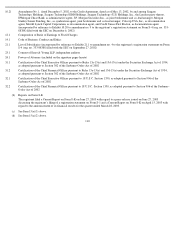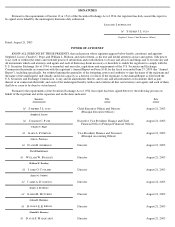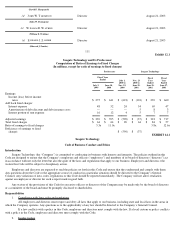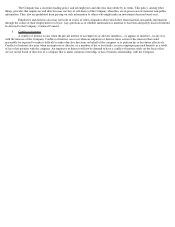Seagate 2002 Annual Report Download - page 121
Download and view the complete annual report
Please find page 121 of the 2002 Seagate annual report below. You can navigate through the pages in the report by either clicking on the pages listed below, or by using the keyword search tool below to find specific information within the annual report.
Conflicts of interests are prohibited as a matter of corporate policy. Any employee or director who becomes aware of a conflict or
potential conflict, or who has a question about whether a conflict exists, should bring it to the attention of the Company’s General Counsel or
the Company’s Chief Executive Officer.
4.
Corporate opportunities
Employees and directors are prohibited from taking for themselves personally any opportunities that arise through the use of
corporate property, information or position and from using corporate property, information or position for personal gain. Employees and
directors are further prohibited from competing with the Company directly or indirectly. Employees and directors owe a duty to the Company
to advance its legitimate interests when the opportunity to do so arises.
5.
Confidentiality
Employees and directors may learn information about the Company that is not known to the general public or to competitors.
Confidential information includes all non-
public information that might be of use to competitors, or harmful to the Company or its customers if
disclosed, or information that associates of the Company have entrusted to it.
Employees and directors must maintain the confidentiality of information entrusted to them by the Company or its associates,
except when disclosure is authorized or legally mandated. This obligation to protect confidential information does not end when an employee
or director leaves the Company. Any questions about whether information is confidential should be directed to the Company’s General
Counsel.
6.
Fair dealing
Each employee and director shall endeavor to deal fairly with the Company’s shareholders, competitors, suppliers and employees.
No employee or director shall take unfair advantage of anyone through manipulation, concealment, abuse of privileged information,
misrepresentation of material facts, or any other unfair practice.
7.
Protection and proper use of Company assets
Theft, carelessness and waste have a direct impact on the Company’s profitability. Employees and directors have a duty to
safeguard Company assets and ensure their efficient use. Company assets should be used only for legitimate business purposes and employees
and directors should take measures to ensure against their theft, damage, or misuse.
Company assets include intellectual property such as trademarks, business and marketing plans, salary information and any
unpublished financial data and reports. Unauthorized use or distribution of this information is a violation of Company policy.
8.
Recordkeeping
All of the Company’
s books, records, accounts and financial statements must be maintained in reasonable detail, must appropriately
reflect the matters to which they relate and must conform both to applicable legal requirements and to the Company’s system of internal
controls. All assets of the Company must be carefully and properly accounted for. The making of false or misleading records or documentation
is strictly prohibited. Unrecorded funds or assets should not be maintained.
The Company complies with all laws and regulations regarding the preservation of records. Records should be retained or destroyed
only in accordance with the Company’s document retention policies. Any questions about these policies should be directed to the Company’s
General Counsel.


